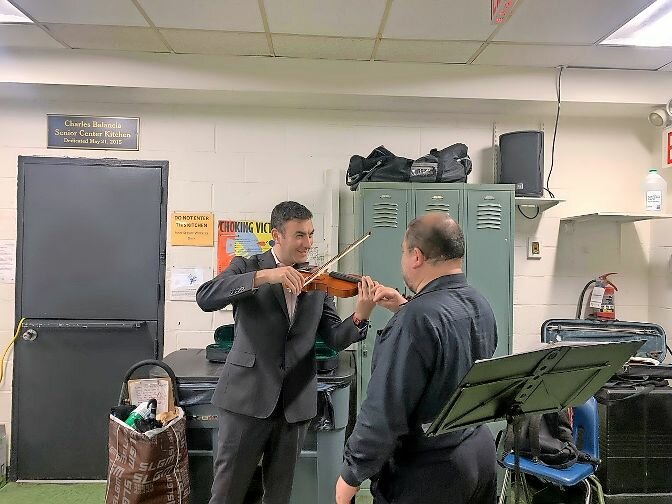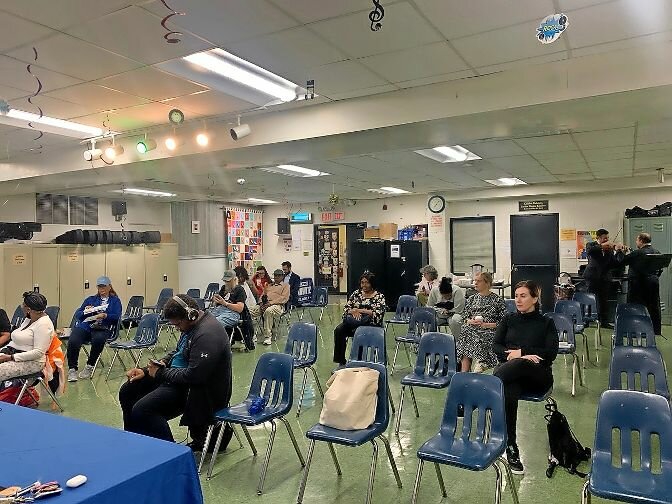Councilman Dinowitz hosts FY25 budget forum, focuses on education, housing and community challenges in Bronx
On a rainy Thursday evening at Mosholu Montefiore Community Center, excerpts from Handel’s Water Music suites performed by award-winning violinist Jorge Avila set the tone for councilman Eric Dinowitz’s first FY25 budget forum.
Avila is a member of the Bronx Arts Council, which previously received $71,000 in discretionary funding from Dinowitz’s office. Emily Hausman and Ben Jackson, of the Ben Franklin Reform Democratic Club, were also present, with Hausman moderating the Q&A session.
For those unfamiliar with the process, the annual city fiscal budget is determined through a collaborative effort between Mayor Eric Adams’ office and the City Council. The process begins with the mayor presenting a preliminary budget outlining a vision and priorities. After several rounds of dialogue and adjustments based on the Council’s feedback, the mayor submits an executive budget. This is followed by public hearings during which agency heads testify about funding needs, helping to determine the most effective allocation of resources.
Dinowitz said the Council and mayor’s office have “competing visions,” with the mayor planning to cut back funding on libraries, cultural institutions, student support programs, City University of New York, and New York Police Department classes among others. It was the Council’s negotiations that fought to restore funding for these essential services, he said.
“Compared to the mayor’s preliminary proposal,” Dinowitz said of the adopted $112.4 billion budget, “we got $2.4 billion more. And that was our commitment to restoring things like libraries, CUNY, housing, schools.”
Dinowitz, a former educator, highlighted education as a primary focus of the new budget. This year’s budget includes $293 million to restore and expand funding for 3K and Pre-K programs.
An additional $480 million will enhance mental health support and arts education for K-to-12 students.
The budget also allocates $64 million to CUNY for successful programs like the ASAP and CUNY Reconnect, which help students with any amount of college credit complete their degrees
Libraries will receive restored funding and increased baseline support to ensure continued access to reading programs and resources.
Other highlights include $2 billion in increased capital funding for the creation and preservation of affordable housing and $13 million for institutions like the Bronx Zoo and Botanical Garden.
Several questions from the audience pertained to the ongoing migrant crisis. Dinowitz criticized the federal government for its handling of the issue, noting the $352-per-night cost per asylum seeker in New York City.
Regarding the new shelter at West 238th Street, Dinowitz explained Westhab, the nonprofit contracted by the city, would oversee social services and security. However, he acknowledged past challenges with the administration over holding nonprofits accountable on coordinating services with the social services department and the education department.
“What’s very important to me,” Dinowitz said, “is that when I think of people seeking a better life for themselves, we do not vilify anyone. We do not demonize anyone. There are people who need help, and we have the legal and moral obligation to help them.”
Dinowitz emphasized new immigrants, like other community members, would benefit from existing social support facilities as well as his office’s efforts to enhance community services, such as free concerts in the park.
Attendees also inquired about how neighborhood beautification would fit into the new budget. Besides $25 million for clean streets, litter pickup and supporting nonprofits like the Bronx Neighborhood Improvement Association, Dinowitz said there would be $100,000 allocated specifically for the planting of trees and urban greening initiatives, as recent storms have taken down many trees with the greater Riverdale community.
Despite the significance of the issues discussed, the forum saw a sparse turnout, with many seats left empty.
Marcelo Lopez, chair of communications of the Unity Democratic Club, said the largest barrier to the community’s participation in politics is the language gap. He cited the 40 to 50 percent Latino population in greater Riverdale, most of whom are first-generation, as well as an additional 15 to 20 percent of first-generation immigrants who are people of color.
“First-generation immigrants are going to be the least knowledgeable about politics in general, so they don’t know how to engage in the first place.” Lopez said.
He also mentioned, in conversations with older Riverdale activists, some recalled their parents had been building captains in the 50s, a time when political involvement was essential for driving change in the city.
“This tradition was never passed on to the immigrants, who felt they just had to make do with what they had,” he said.










